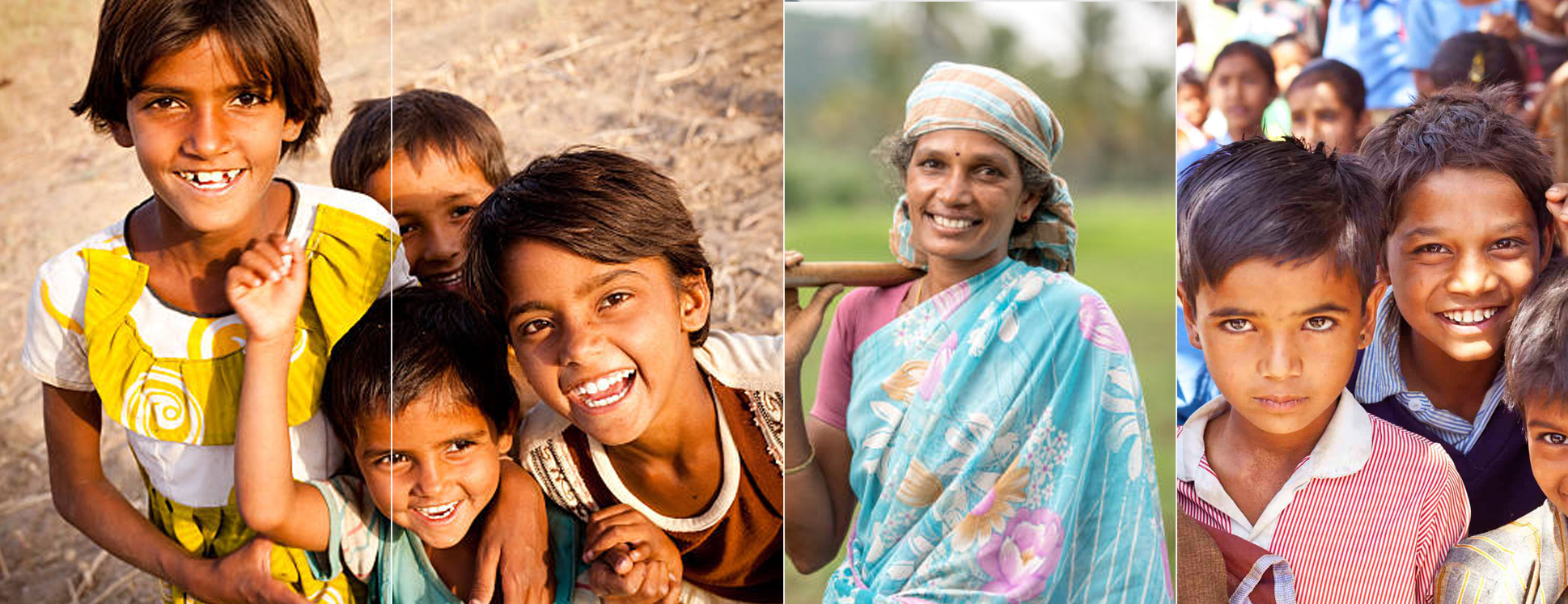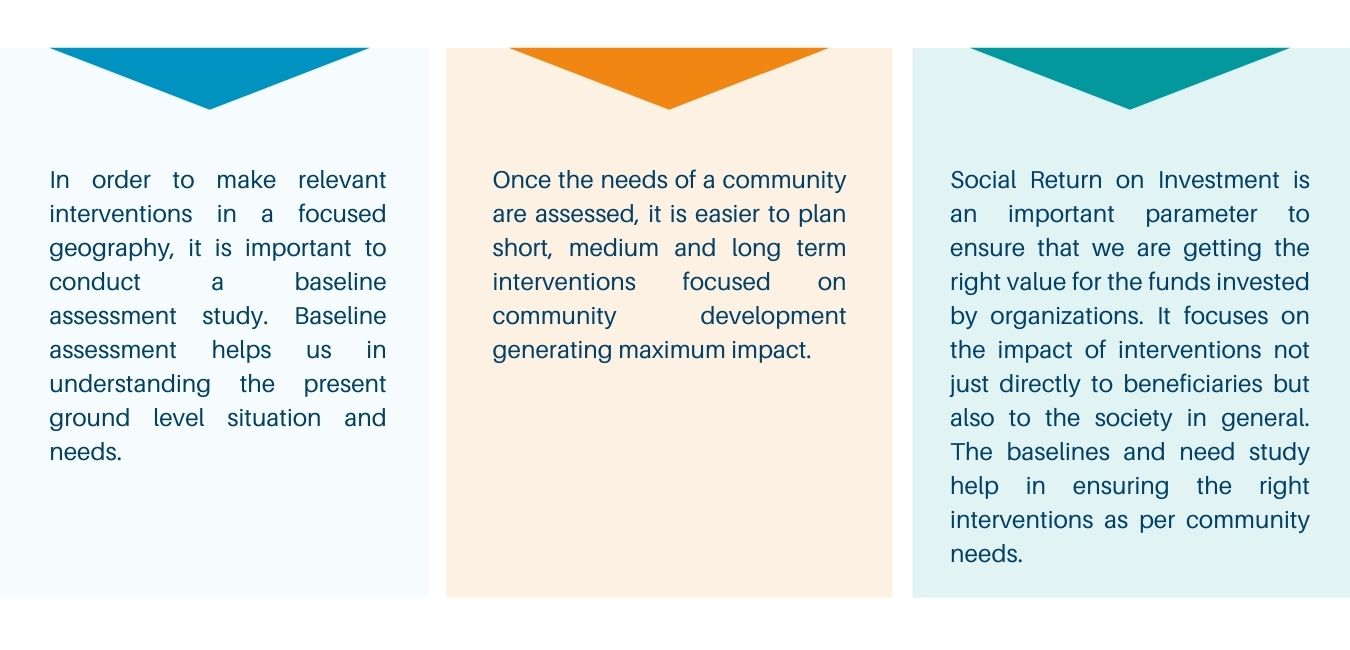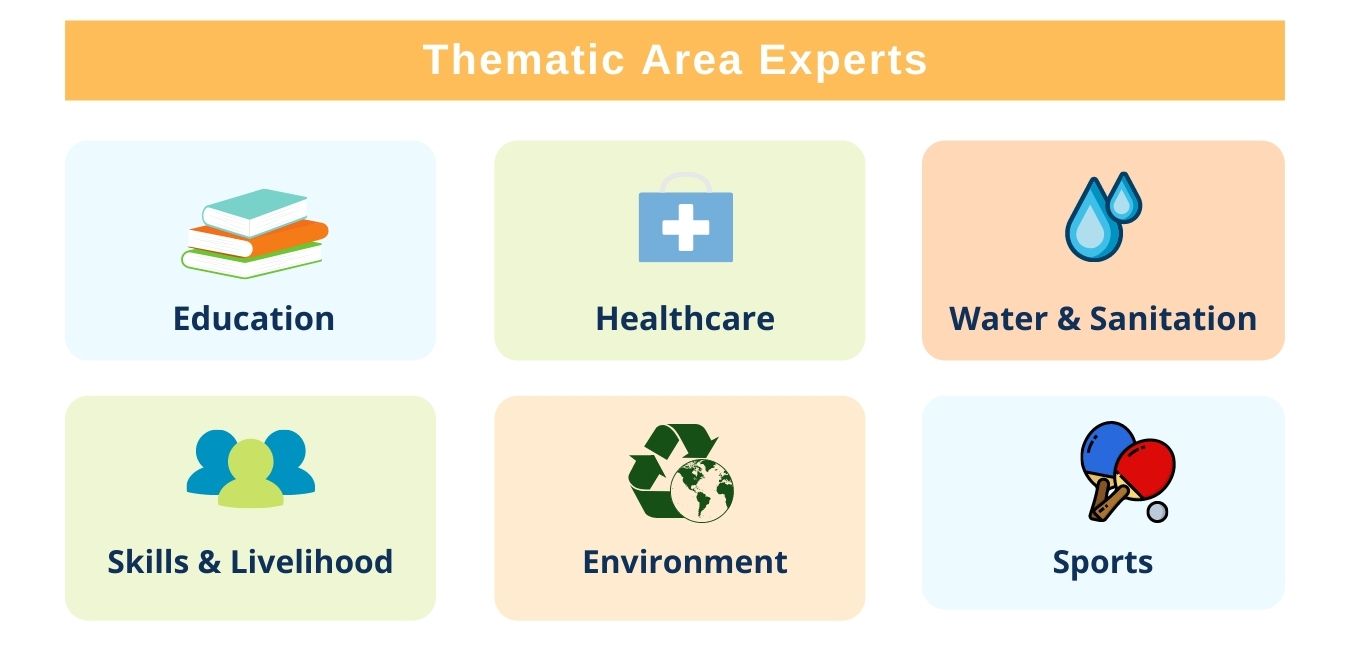- Home >
- Our Services >
- Baseline Study

Baseline assessment or needs assessment are typically used interchangeably. They typically refer to assessing the community needs of a focus geography. The baseline assessment refers to understanding the community needs through discussions, surveys, the community statistics available at the goverment and others agencies, etc.

Our Baseline Assessment study is focused on assessing the needs of a community in the geography of focus. We initiate by just understanding the data available in the government records, any regional studies, etc. Once we have collated this data, we also perform our own on-group assessment focused on understanding demographic profile, socioeconomic status, existing government schemes, community feedback ,etc. Once the data is available, it becomes easier to assess the community needs and design interventions on the identified needs.
| Aspect | Need Assessment | Baseline Study |
|---|---|---|
| Purpose | Identify and understand the needs of a target population to inform program design. | Establish starting values for key indicators to measure program impact later. |
| Timing | Conducted before program planning or design begins. | Conducted after program design but before implementation. |
| Focus | Focuses on identifying gaps, priorities, and challenges within the community or population. | Focuses on measuring specific indicators related to program goals. |
| Outcome | Provides a foundation for designing interventions and setting objectives based on needs. | Provides a benchmark for future evaluations to assess changes due to the program. |


A baseline study is conducted to help organizations set realistic goals and design effective interventions. It serves as a reference point to measure progress over time. It provides data-driven insights for decision-making and impact assessment.
A baseline study is conducted in a structured manner to gauge the initial conditions of a project before any interventions take place. It starts with defining objectives, engaging stakeholders, selecting research methodologies, and collecting data through surveys, interviews, and field visits. Next, the data is collected and analyzed to determine key indicators and provide a benchmark for future impact assessment. The study should offer a detailed report so that organizations can measure progress effectively, optimize resources, and create a meaningful change.
Baseline studies are usually conducted by research organizations, CSR consultants, NGOs, development agencies, and companies investing in social impact projects.
A baseline study collects both quantitative and qualitative data based on performance indicators which may include demographics, socio-economic conditions, and existing challenges.
The duration of a baseline study depends on the project's scope, complexity, and depth of research required. A small-scale study may take a few weeks, while larger studies covering multiple locations can take several months to complete. Typically, it ranges from 4 weeks to 6 months.
A baseline study is conducted before a project starts to establish initial conditions, but an impact assessment is conducted after implementation to evaluate the effectiveness of a project.
SoulAce specializes in conducting baseline studies and ensures that CSR investments lead to real, measurable social change. The field experts are well equipped to provide a clear starting point by assessing the current socio-economic conditions of a target community before implementing a CSR program. They identify key challenges, analyze existing data, and design a custom research methodology, combining both qualitative and quantitative tools. Reliable data from communities, stakeholders, and beneficiaries are collected to establish key performance indicators. Next, this data is thoroughly analyzed to provide insights into gaps, opportunities, and areas of improvement. Finally, a comprehensive report with key findings, trends, and actionable recommendations is presented to help companies design high-impact CSR programs.
Baseline studies establish a data-driven foundation for CSR and ESG initiatives. It helps companies understand the pre-existing conditions so that the interventions are need-based, effectively designed, and measurable over time. In ESG projects it sets benchmarks to track progress and sustainability goals so that companies can comply with regulatory requirements and enhance stakeholder transparency. Setting clear KPIs leads to tangible, long-term change.
Lack of reliable data, resource constraints, access to remote areas, and ensuring unbiased and accurate information collection are some of the challenges.
SoulAce provides a combination of primary and secondary data sources, scientific research methods, and advanced data analytics to ensure accuracy, reliability, and unbiased reporting.
SoulAce conducts stakeholder consultations to design research frameworks that align with specific needs. The approach is tailored based on industry, target beneficiaries, and project goals.

Corporate Social Responsibility (CSR) is a key component of organisational operations, with companies looking to have a positive impact on society and the environment. However, measuring the impact of CSR initiatives can be challenging.

Corporate Social Responsibility (CSR) initiatives are becoming increasingly important for companies. It enhances their reputation and demonstrates their commitment to making a positive impact on society and the environment.

Corporate Social Responsibility, or CSR in general, is a set of self-regulating practices that an organization adopts to make itself socially accountable to itself, its stakeholders, and the public.